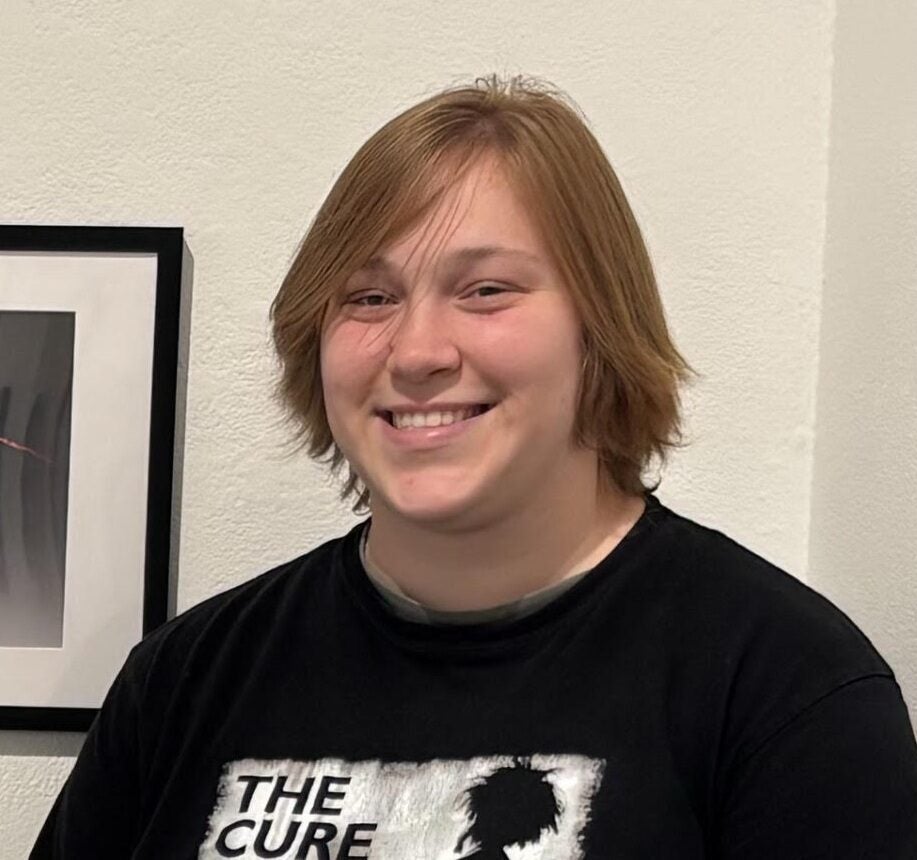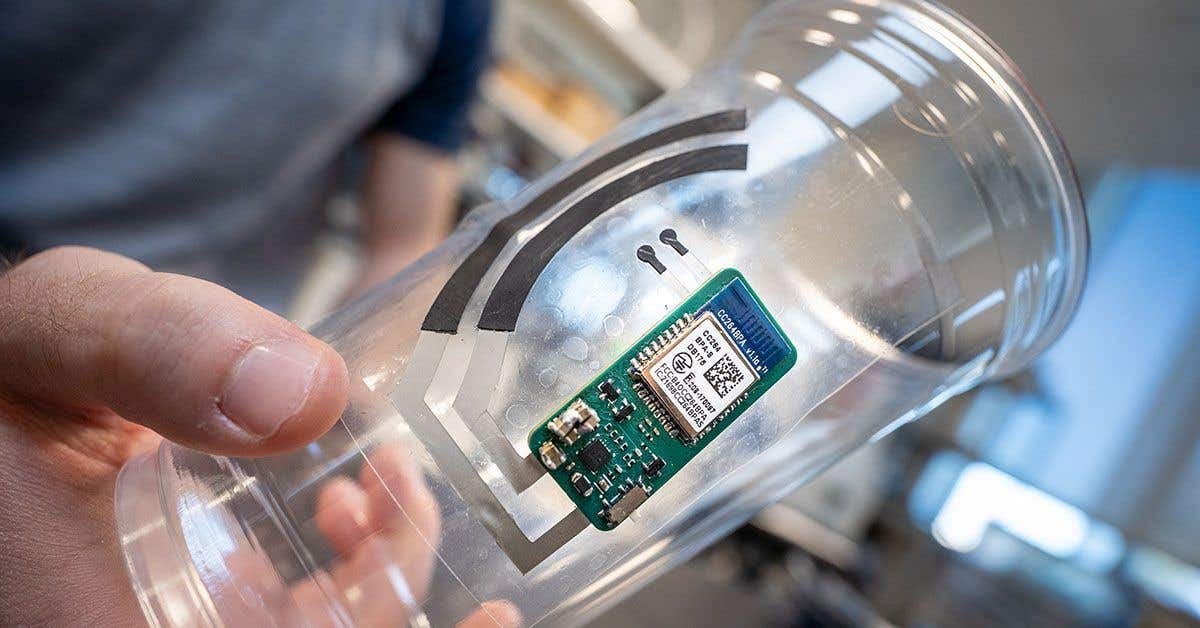Sweat-powered sensor converts any cup into a portable health monitoring system
University of California San Diego engineers create a battery-free Smart Cup that tracks vitamin C levels from fingertip sweat.

 Edited By: Joseph Shavit
Edited By: Joseph Shavit

This battery-free electronic sticker can be placed on everyday items, such as a drinking cup, to track a person’s vitamin C levels by analyzing sweat from their fingertip. (CREDIT: David Baillot/UC San Diego Jacobs School of Engineering)
For millions of individuals, an inadequate diet continues to inflict severe harm, both somatically and economically. Vitamin C, one of the essential nutrients for healing and immunity, is not stored by the body, and you must eat it consistently to maintain health.
But vitamin C levels have been measured through blood tests that use expensive equipment, as a trip to the lab is often required. Now, a new device from engineers at UC San Diego could change that—by turning a mundane cup into a high-tech health monitor.
A Cup That Can Read Your Body
The device, described in a paper that appears in the journal Biosensors and Bioelectronics, is not new medical equipment. It is a flexible electronic sticker that adheres to the outside of a single-use cup. Once the cup is held in your hand, the sticker collects trace amounts of sweat from your fingertips—no needles, no exercise, no work. In a matter of minutes, the system scavenges enough energy from your natural perspiration to power a built-in vitamin C sensor, which transmits the results to a nearby laptop wirelessly.
It works because the system includes a biofuel cell that uses tiny amounts of chemicals found in sweat to produce electricity. That energy is used to charge a small piece of circuit board that reads the level of vitamin C in your sweat and sends the data via Bluetooth Low Energy. All this happens while you drink your morning coffee or orange juice.
“By retrofitting everyday items such as cups or bottles into smart sensors, individuals can receive real-time information about their health and wellness without changing anything about their daily routine,” said Patrick Mercier, the co-senior author of the study and a professor of electrical and computer engineering at the University of California, San Diego. “It is a step towards a future of ‘unawareables’— a sensor that is unobtrusive and essentially invisible so that you are unaware that you even have it.”
The Importance of Vitamin C
The stakes are high. Malnutrition is still one of the leading health problems in the world. In 2017, nearly 11 million deaths and almost 255 million years of disability worldwide were related to dietary risks. Close to half of deaths from malnutrition are in children under five years of age. Low-income families typically experience the most severe effects, often due to not being able to afford high-quality food or frequent laboratory tests.
Vitamin C is crucial to immune defense, tissue healing, and iron absorption. If a person does not have enough vitamin C, he or she may experience bleeding gums, anemia, and delayed wound healing. The body also clears itself of excess vitamin C, so healthy levels require constant intake and frequent monitoring—something that the Smart Cup allows to be done outside of the clinical context.
In addition to the shift to everyday items and oversight of family dietary habits, traditional methods of testing vitamin C rely on a laboratory method known as High-Performance Liquid Chromatography (HPLC).
Typical clinical laboratories charge approximately $50 per test in the U.S., which is far too expensive for families or students to rely on for regular monitoring. Nevertheless, the Smart Cup may ideally stub out the aforementioned challenges and make tracking your nutrition as simple as taking a sip of water.
Power From Your Fingertips
You may not know this, but your fingertips are the most active sweat producers on your body aside from your armpits. Each fingertip contains over a thousand sweat glands that can excrete up to a thousand times the perspiration that other parts of the body can.
This continuous process produces enough fuel to perpetuate the operation of the Smart Cup without a battery. Sweat produced by the fingertips powers the biofuel cell to enhance its voltage to drive the embedded electronics. Since the system does not need a battery, it is cheaper, smaller, and easier to recycle or toss away after use.
"Most people only get a glimpse of their health on a yearly basis by visiting the doctor," said Mercier. "But our bodies are changing much more frequently than that. Our aim is to make health data accessible through similar contexts as simply holding your morning coffee cup or orange juice bottle."
The research group verified the system by having participants use the cup after taking vitamin C supplements. The sensors accurately captured the vitamin C level increase tracked by the sweat from the participants’ fingertips.
Even more remarkably than that, the device powered itself for over two hours using only natural perspiration to support its total output.
A Step Beyond Wearables
This work was joint research between Mercier’s lab and the lab of Joseph Wang, who is a Professor in UC San Diego's Aiiso Yufeng Li Family Department of Chemical and Nano Engineering. Wang's lab is at the forefront of wearable health technologies, including tattoo-like sensors and fingertip-powered wearables. Mercier's group focuses on ultra-low-power, always-on, battery-free, wireless systems. This research was the elegant extension of this work, according to Wang.
"By moving sensors from the skin to the cuff of cups and bottles, we expand what wearable technology is," said Wang. The researchers view this as part of the shift from wearables to unawareables, where data is passively and comfortability collected in the background of daily life.
Practical Implications of the Research
The Smart Cup can provide access to personal-nutrition monitoring for everyone, and at a low price point - likely only a few cents each. This research could have a large-scale impact not only in developing or third-world nations, but also for community health programs. The Smart Cup would be a game-changer for both doctors and dietitians with the ability to monitor remote patients in real time, providing feedback on nutrient intake.
Future versions can monitor various nutrients and biomarkers, with the data being transmitted directly to smartphones or smartwatches. Chronic conditions would be made easier to manage long-term with this sort of technology.
This technology could open doors for researchers in preventive medicine and nutrition science. In the near future, a cup of water may not only quench your thirst, it may also quietly track your well-being.
Research findings are available online in the journal Biosensors and Bioelectronics.
Related Stories
- Stretchy, wearable, throat sensor revolutionizes remote health monitoring
- New eye patch sensor uses light to detect eye health problems
- Revolutionary paper sensors easily track personal health and environmental safety
Like these kind of feel good stories? Get The Brighter Side of News' newsletter.
Mac Oliveau
Writer
Mac Oliveau is a Los Angeles–based science and technology journalist for The Brighter Side of News, an online publication focused on uplifting, transformative stories from around the globe. Passionate about spotlighting groundbreaking discoveries and innovations, Mac covers a broad spectrum of topics including medical breakthroughs, health and green tech. With a talent for making complex science clear and compelling, they connect readers to the advancements shaping a brighter, more hopeful future.



